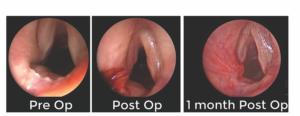Within a decade, otolaryngologists may use liquid biopsies to diagnose and guide the treatment of head and neck cancer, chronic rhinosinusitis, Ménière’s disease, and more.



INTRODUCTION Posterior glottic insufficiency (PGI) is a potential sequela of prolonged intubation. Sustained pressure from the endotracheal tube results in ulceration, erosion of the vocal process, and subsequent tissue loss of the medial […]
Among the highlighted findings in this analysis is the importance of laryngoscopic examination to detect preoperative vocal cord paralysis.
Stimulated Raman histology can rapidly produce images similar to FFPE H&E in sinonasal and skull base tumors.
Dilute versions of PVP-I nasal spray appear safe for topical use in the nasal cavity, but PVP-I does not demonstrate virucidal activity in COVID-19–positive patients.

The Trachealator is a novel, non-occlusive balloon dilator designed for single use.

All patients treated with the hole-punch technique had excellent results with no additional recurrences, and no patients developed cauliflower deformity.
What do variables in the National Cancer Database (NCDB) suggest about treatment decisions between surgery and radiation for early stage glottic carcinoma (EGC)? BOTTOM LINE Most patients in the NCDB […]
The Questionnaire of Olfactory Disorders (QOD) might help predict symptoms of depression in olfactory dysfunction (OD) patients.
Care delays related to evaluations by multiple providers and misdiagnosis prolong the time to diagnosis in patients with oropharyngeal squamous cell carcinoma that is not associated with, or negative for, human papillomavirus.